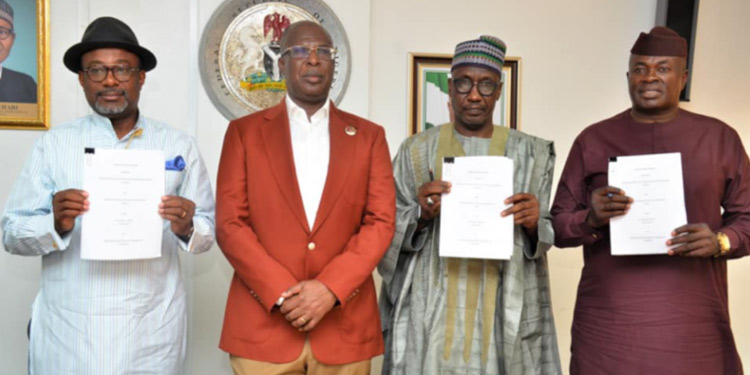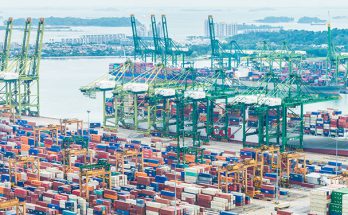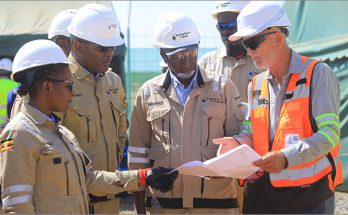 The Nigerian Content Development and Monitoring Board (NCDMB), the Nigerian National Petroleum Corporation, and ZED Energy Limited signed a shareholders agreement for the construction of the Brass Petroleum Products Terminal Limited (BPPT) in Okpoama, Brass Local Government Area, Bayelsa State, on last week in Abuja.
The Nigerian Content Development and Monitoring Board (NCDMB), the Nigerian National Petroleum Corporation, and ZED Energy Limited signed a shareholders agreement for the construction of the Brass Petroleum Products Terminal Limited (BPPT) in Okpoama, Brass Local Government Area, Bayelsa State, on last week in Abuja.
The project’s anticipated cost is N10.5 billion (Ten Billion, Five Hundred Million Naira). NCDMB and NNPC each own 30%, while ZED Energy, a private company, owns 40% and will run the facility once it is completed. The terminal would make refined petroleum products available at riverine communities of the Niger Delta at the standard prices, discourage the operations of illegal refineries and create job opportunities for citizens of the Niger Delta and other Nigerians.
The terminal, which can contain up to 50 million litres of products, would act as a strategic reserve for the country. It would also function as a two-way product jetty, allowing land and sea vehicles to load automobile gas oil (AGO), premium motor spirit (PMS), dual purpose kerosene (DPK), and aviation turbine kerosene (ATK).
According to the project’s promoters, the project will improve energy security in the Niger Delta and is estimated to generate 1000 direct jobs during construction and another 5000 direct and indirect jobs throughout the operations phase, due to the nature of downstream operations.
Chief Timipre Sylva, Minister of State for Petroleum Resources, called the project “another huge achievement of President Muhammadu Buhari in the Niger Delta.”
The Minister emphasised that no previous president of the country had had a greater impact on the oil sector in the Niger Delta region than President Buhari, citing the Oloibiri Museum and Research Center (OMRC), the Brass Fertilizer and Petrochemical Company Ltd (BFPCL), and the Nigerian Oil and Gas Park, among others.
Residents of riverine areas had long purchased refined petroleum goods at exorbitant costs due to the high expense of delivering products to those areas, according to Sylva. He also attributed the prevalence of illegal refineries in the region to the non-availability legitimate alternatives and expressed hope that the Brass Petroleum Products Terminal Limited (BPPT) would solve some of the problems of the Niger Delta region.
The Minister also praised the smooth coordination on the project between the NCDMB, NNPC, and ZED Energy, implying that similar collaboration was required to propel Nigeria’s oil and gas industry ahead.
Engr. Simbi Kesiye Wabote, Executive Secretary NCDMB, highlighted the economic benefits of co-locating the BPPT with the Energy Infrastructure Park being developed at Okpoama and the Brass Fertiliser and Petrochemical Company Ltd (BFPCL) at Odioma, Brass – both projects being developed with NCDMB equity financing.
He said: “If you go to developed economies, there are parks for manufacturing and industrialization. When you have the Brass Fertilizer, the BPPT and the refinery that is being built in the same area, you get the benefits of being within a Free Trade Zone. It will bring down the costs of developing those products simultaneously because the raw materials are just behind them. There is no reason to take the investments to distant locations where costs would increase.”
Mallam Mele Kyari, NNPC’s Group Managing Director, said the national oil firm should have invested in the terminal 30 years ago and expressed joy that it is finally happening and will be delivered.
He said: “Beyond the clear social responsibilities, this makes business sense. The location of the planned depot would create a platform for the delivery of petroleum products to some of our offshore facilities
“NNPC is playing the role of facilitating the supply of petroleum products to all sections of this country, more importantly to the region that produce the resources, where refined products are not readily available. This initiative would make sure that we deliver products in the most fair and equitable means.”
Mr. Bala Wunti, Group General Manager, National Petroleum Investment Management Services (NAPIMS) and Project Lead of the BPPT, stated that there has been no significant downstream activity or investment in Bayelsa since the start of oil exploration at Oloibiri in 1958.
He further stated that Bayelsa State produces 40 percent of Nigeria’s onshore and swamp crude oil and hosts some of the nation’s Deepwater prospects and assets, yet there was no correlation with the level of socio-economic development and employment. “Our intention is that this adventure would try to close that gap,” he promised.
He also verified that the project’s cost was estimated at N10.5 billion (ten billion, five hundred million naira) based on pre-engineering and pre-front-end engineering design (Pre-FEED). He asserted that the funding would come from the partners and that there would be no financial hazards.
He added: “We have done our baseline survey and we want to start procurements of long lead items and several other things, including engineering. The idea is that long before 2023, we would have this depot up and running. It would bring a uniqueness and innovative depot platform. This will be a dual loading facility; it would load land trucks and marine trucks. It means we are creating something that is better that floating storage. It will also reduce demurrage. “



